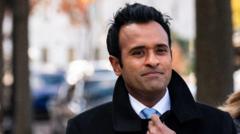The debate over H-1B visas has sparked significant discord among Republican leaders, with Vivek Ramaswamy advocating for skilled foreign workers while Nikki Haley and far-right influencers push back fiercely. This conflict signals growing divisions within the party as immigration emerges as a contentious issue.
Tensions Emerge Among GOP Over H-1B Visa Policies

Tensions Emerge Among GOP Over H-1B Visa Policies
A heated online exchange among Trump allies highlights diverging opinions on immigration and the H-1B visa program, stirring potential controversies ahead of the upcoming Trump presidency.
In a recent social media confrontation, notable supporters of President-elect Donald Trump have publicly wrestled with differing perspectives on the H-1B visa program, which facilitates the hiring of skilled foreign workers in the tech sector. The dispute emerged following a tweet from Vivek Ramaswamy, a staunch Trump ally and appointee intended to streamline government spending. Ramaswamy contended that the H-1B system was vital for enhancing U.S. economic competitiveness, asserting, "Our American culture has venerated mediocrity over excellence."
His assertion quickly ignited a firestorm of criticism online, particularly from hardline Trump supporters who take a firm stance against immigration. The argument unfolded throughout the holiday season, drawing participation from mainstream Republican figures and far-right influencers who vehemently opposed Ramaswamy’s position. Elon Musk, the tech mogul selected to co-lead Trump's proposed "Department of Government Efficiency," voiced his support for Ramaswamy’s pro-H-1B stance.
However, former U.N. ambassador and GOP presidential contender Nikki Haley countered, emphasizing the value of American workers and culture. "There is nothing wrong with American workers or American culture," she asserted in her own post, inviting a robust debate about the prioritization of domestic talent over foreign. The discourse intensified with posts from far-right figures like anti-Islam activist Laura Loomer, who criticized Trump's appointment of Sriram Krishnan as senior advisor on artificial intelligence, labeling him a "career leftist" and denouncing Indian immigrants as "invaders."
Loomer also vocally criticized Musk for alleged censorship while reinforcing her disdain for the H-1B program. Musk had previously defended the initiative, asserting it attracts “the top ~0.1%” of engineering talent and likening America's economic situation to a competitive sports team. Critics, however, suggested that H-1B visa holders often accept lower salaries, alleging this undermines wage growth for American workers.
Research indicates that a predominant percentage of H-1B visas has historically been awarded to Indian nationals, raising questions about the program's implications for employment equity within the U.S. landscape. Although Trump has positioned himself against the H-1B program in the past and threatened mass deportations post-inauguration, his close connections with tech industry leaders may complicate this stance.
Throughout this discourse, Trump has refuted claims that his decisions are excessively influenced by Musk and other billionaire supporters, reinforcing his agency within the political sphere. As immigration remains a divisive topic, the deliberations signal potential challenges for Trump's administration as differing factions within his base continue to vie for influence.





















